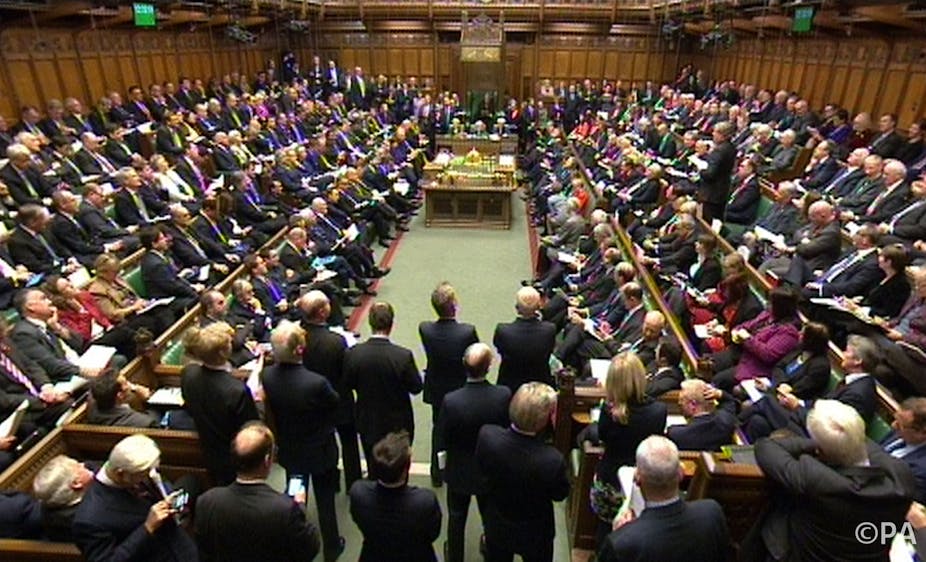A swathe of parliamentary and electoral reforms are sought by the Labour Party, including measures to contain rowdy behaviour in the House of Commons. In particular, there are calls for the introduction of a “sin bin”, alongside new powers for the speaker to address the shouty politics of Prime Minister’s Questions (PMQs).
Labour has cited Hansard Society research showing that people view PMQs as “noisy”, “childish” and “over the top”, raising concerns that the Punch and Judy show puts people off politics.

Keeping it civil
We must question the premise under which reform is proposed. While people do say the rowdy behaviour at PMQs turns them off, I wonder how many watch the whole half-hour (often longer because of Speaker John Bercow’s interventions). I suspect those theatrical, combative moments presented on the main news bulletins are among the few bits of PMQs which the general public get to see.
Not shown on the six o’clock news are the moments of consensus between the prime minister and the leader of the opposition when discussing issues of national importance such as war, security threats and floods. All of these matters are dealt with in a way that we would expect grown adults to speak to each other: calmly, in a considered manner, and – as my research shows – politely.
Certainly omitted from the news coverage are the interactions between backbenchers and the prime minister. The research here shows that politeness rules the day. Even opposition MPs often produce their questions with politeness, for example by eschewing criticism of the government, making unrelated supportive comments or asserting that any negative effects are unintended.
We can explain this in terms of getting things done – most constituency MPs asking questions at PMQs are looking for the prime minister’s support on a constituency matter; he is far less likely to oblige if the question is asked in a rude or aggressive manner.
A time for change
A sensible reform, then, would be one which allows even more people to watch PMQs live and unedited. We have seen that there is public appetite for political programming. The popularity of the leaders’ debates and the EU debate between Farage and Clegg demonstrate this. But as it stands, shown at noon on a Wednesday, PMQs is not watched in full, and a false impression of what goes on is generated by edited news broadcasts.
Moving PMQs to a more appropriate time could also have an impact on politicians, with the worst offenders modifying their behaviour because they know that more people are observing their clowning around. What’s more, the reliance on sound-bites that has developed at PMQs could also be reduced, since there would be far less pressure on politicians to say something pithy to make the 30-second summary on the main news bulletins.
Boxing match mentality
That said, it cannot be denied that the interactions between the prime minister and the leader of the opposition are fierce, and add another layer to the debate about PMQs. Aside from the harsh words they exchange, the sheer volume of heckling and insults despatched across the chamber do not give the impression of level-headed, cool, rational thinking.
Indeed, it may hold that the person who shouts the loudest is often the one who is losing. But is it all that bad a thing? It certainly would be if we compare PMQs with a meeting at work. Indeed, one of the audience comments in the Hansard Society report says: “if I went off like that in my job I would be sacked”.
This may not be the right anaology: I think it is preferable to see the leader of the opposition and the prime minister’s exchanges in terms of a boxing match, where barbed comments are thrown instead of punches. In this light, we can view the backbenchers like supporters at a boxing match, cheering on their corner: the louder the cheers, the greater the support.
This aspect of PMQs is important because it acts as a political weather vane; when the backbenchers are quiet it can tell us something about the mood of the parliamentary party. That insight would be lost if we were to have a sedate chinwag every week.
So while reform seems inevitable, we need to ensure that it does not go too far. We need our politicians to be passionate, engaged, and even angry on our behalf. It seems that bit of rough and tumble is the price we have to pay to ensure that the green benches are filled with MPs fighting the corner for their constituents.

